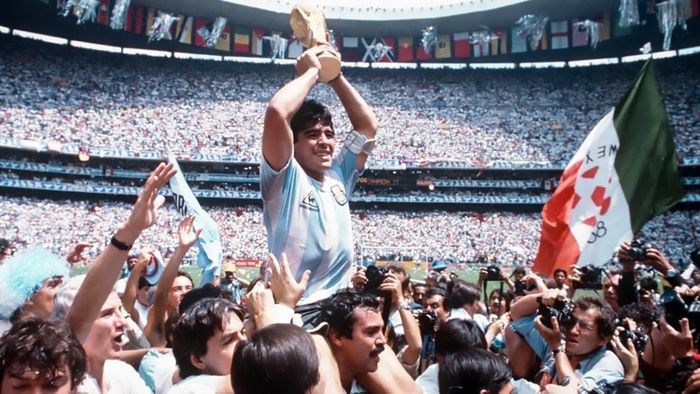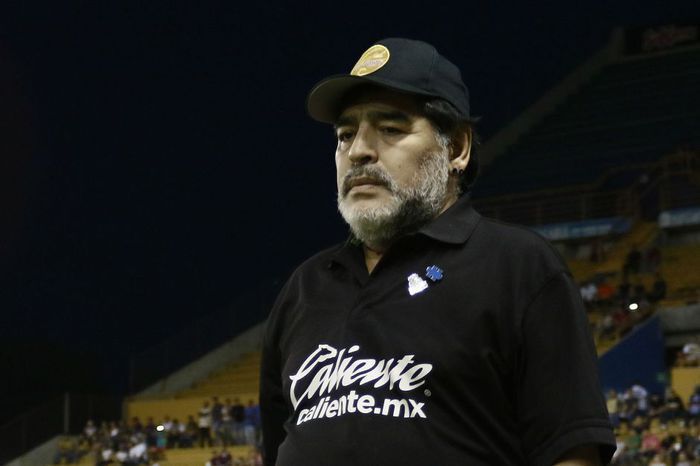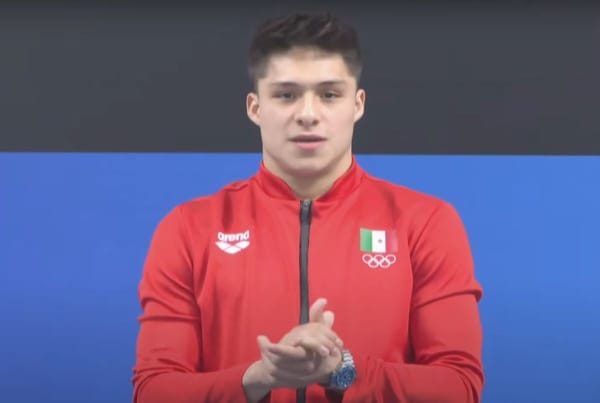"He never gave up his ideals", López Obrador's farewell to Diego Maradona
In Mexico, Maradona lived his stellar moment as a soccer player. He never renounced his ideals even though he paid the cost of being "politically incorrect".

The death of Diego Armando Maradona continues to shock the world, and not only of sport but also of politics. Through their social networks, various state leaders have expressed their condolences to the Argentine people for the loss of their soccer star, who led them to glory in the 1986 World Cup in Mexico.
It was precisely this World Cup, with which the President of Mexico, Andrés Manuel López Obrador, wanted to remember. On Wednesday afternoon, in his Twitter account, in addition to lamenting his death, the president said that it was in the Aztec territory where he had his peak period and that thanks to him, his love for this sport was born.
In Mexico, Maradona lived his stellar moment as a soccer player. Personally, he was the reason why I found this sport so enjoyable.
However, together with the titles he won on the field, the Mexican president revealed that what he most admired in Maradona were his ideals and congruence:
But my greatest admiration was always his congruence. He never gave up his ideals even though he paid the cost of being 'politically incorrect'.
And that the Argentinean star took advantage of his media presence to give his opinion on politics, both in his country and in other Latin American nations, which were not always well received. For example, he was criticized for supporting the dictatorial regimes of Fidel Castro in Cuba, Evo Morales in Bolivia, and Hugo Chávez and Nicolás Maduro in Venezuela, who were close friends.
Their positions led them to make enemies with FIFA for their way of directing and doing business with soccer at a global level, exploiting the players.

The land of the Chapo in which not even Diego Maradona could defeat the supremacy of baseball
One of the world's most media-savvy soccer stars, the Argentine Diego Armando Maradona, arrived in Culiacan, but Culiacan, passionate about baseball and besieged by drug trafficking, resisted his charms. The rumor was implausible and only confirmation of the deal got the fantasy label out: Diego Maradona, one of the stars of football, had agreed to lead the Dorados of Sinaloa, a discreet team from the second division of the Mexican League.
After the announcement came commotion and expectation, as in everything around the former Argentine footballer. Maradona would imminently arrive in Culiacan: a city intimately related to high temperatures, baseball, and drug trafficking. The city, in northwestern Mexico, is the epicenter of the Sinaloa Cartel, founded by Joaquin "El Chapo" Guzman, once one of the world's most wanted criminals and now serving a life sentence in the United States.
Netflix covers the intimate story of Maradona in Mexico with a documentary series of seven chapters in which is portrayed the passage of the 1986 world champion in the Great Fish and also his personal life in Culiacan.
In the sports command, for its part, Culiacán has always been one of the most traditional squares of Mexican baseball, whose tradition is impregnated above all in the northern countries of the country, closer to the United States. Only Sinaloa is home to three teams from the Pacific League: the Tomateros de Culiacán, the Cañeros de Los Mochis and the Venados de Mazatlán.
Maradona, one of the most important media figures in world football, reached one of the strongholds of a different sport and a city where the constant confrontation between criminal organizations is the daily bread.
The beginning
Maradona arrived in Culiacan along with former goalkeeper Luis Islas as a technical assistant. The interest that he aroused among local and international media, however, was a bit short with what awaited him from the local fans. Despite a large reception at the airport, that would be the constant of his time at the Gran Pez.
Once in Culiacán, he moved to a hotel, where he would live during his stay in Sinaloa. According to local media, a group of neighbors of the exclusive neighborhood "La Primavera" opposed the eccentricity of having Maradona as a neighbor, which, in their opinion, would disturb the tranquility of the place.
The football fan got energized, bought season tickets, and the average attendance improved from then on in the Culichi team stadium and wherever Dorados went. But, after all, the sport remained with the minority status it has always had.
Culiacan didn't change its routines or be altered by Maradona. Although the team began to sell T-shirts with the number 10, the flannel of the Tomateros surpassed in the streets and squares to those of Dorados. The media's curiosity was not equal to that of ordinary people.
A local fan summed up the subject in a sentence: "I like football, but if you play Dorados and you play Tomateros, I'd rather go and see the Tomateros". In addition to the popularity of baseball, local teams have been successful in recent times.
The Maradona Revolution: On the field and not on the streets
The Argentinian, with a discreet resume on the bench that contrasted with his extraordinary but irregular career as a player, arrived in Dorados at a delicate moment for the team, which at the start of Apertura 2018 in the Second Division had begun with several setbacks, forcing the management to dismiss Paco Ramirez as a coach.
However, things immediately changed with Maradona. After a good start, the team returned to the Liguilla area, from where they never left again, and that semester the team finished seventh and got their ticket to the title finals.
Meanwhile, Maradona was a phenomenon in his own right on the pitches he no longer played on: players, including rivals, gave in to his feet. The youngest players, who never saw him play, asked him for a picture or an autograph. The coaches would gladly come to greet him at the beginning and end of the matches.
The stadiums to which Dorados traveled used to have better attendance when Maradona visited them. People swirled in the hotels where the team concentrated. Argentine television viewers were looking for a way to watch the matches of the Mexican ascent from their country. And the results backed him up.
In his first tournament, Maradona led the Dorados to the final. On his way, he got rid of the first and second qualifiers. However, in the final, the Dorados would fall to Atletico San Luis, Atletico Madrid's subsidiary in Mexico that had injected money to consolidate the project.
However, the sensations were positive. Maradona, despite the doubts, remained for the 2018 Clausura tournament. The team, without his leadership, had a hesitant start, but when the Argentinian returned, everything changed, once again, as every time, for better or for worse, Diego appears.
El Gran Pez once again qualified for the Liguilla, an achievement that few first-time coaches in Mexican football achieve. In the finals, Maradona's charges got rid of two better-placed teams again but met again in the final with Atletico, who repeated the dose of the previous semester.
The end
Maradona's continuity was once again called into question during the summer break (boreal) in Mexican football. But, in this case, the Argentinean's decision was not to continue the third semester in Culiacan. The former captain of the Argentine national team decided by putting his health in the foreground.
"Diego Maradona decided not to continue in the technical direction of Dorados. On medical advice, he will devote time to his health and will undergo two operations: shoulder and knee. We are grateful to all Dorados' family and we will continue the dream together later on," confirmed his lawyer Matías Morla in June.
Although he could not meet the objective of promotion, Maradona left a good taste in Culiacan, although the two lost finals weighed on the team, which today fights in the middle of the table and is looking for a coach, as Jose Guadalupe Cruz, the successor of the Argentine, was fired for the bad results.
Maradona, for his part, could not revolutionize Culiacan as he has done in countless cities around the world, but his work mitigated the criticism he received on his arrival in northwest Mexico when it was predicted a resounding failure for his lack of curriculum.
Now 59, he directs Gimnasia y Esgrima La Plata in the Superliga Argentina, where the Villa Fiorito has revived a club that seemed doomed to relegation and today fights to save the category.




